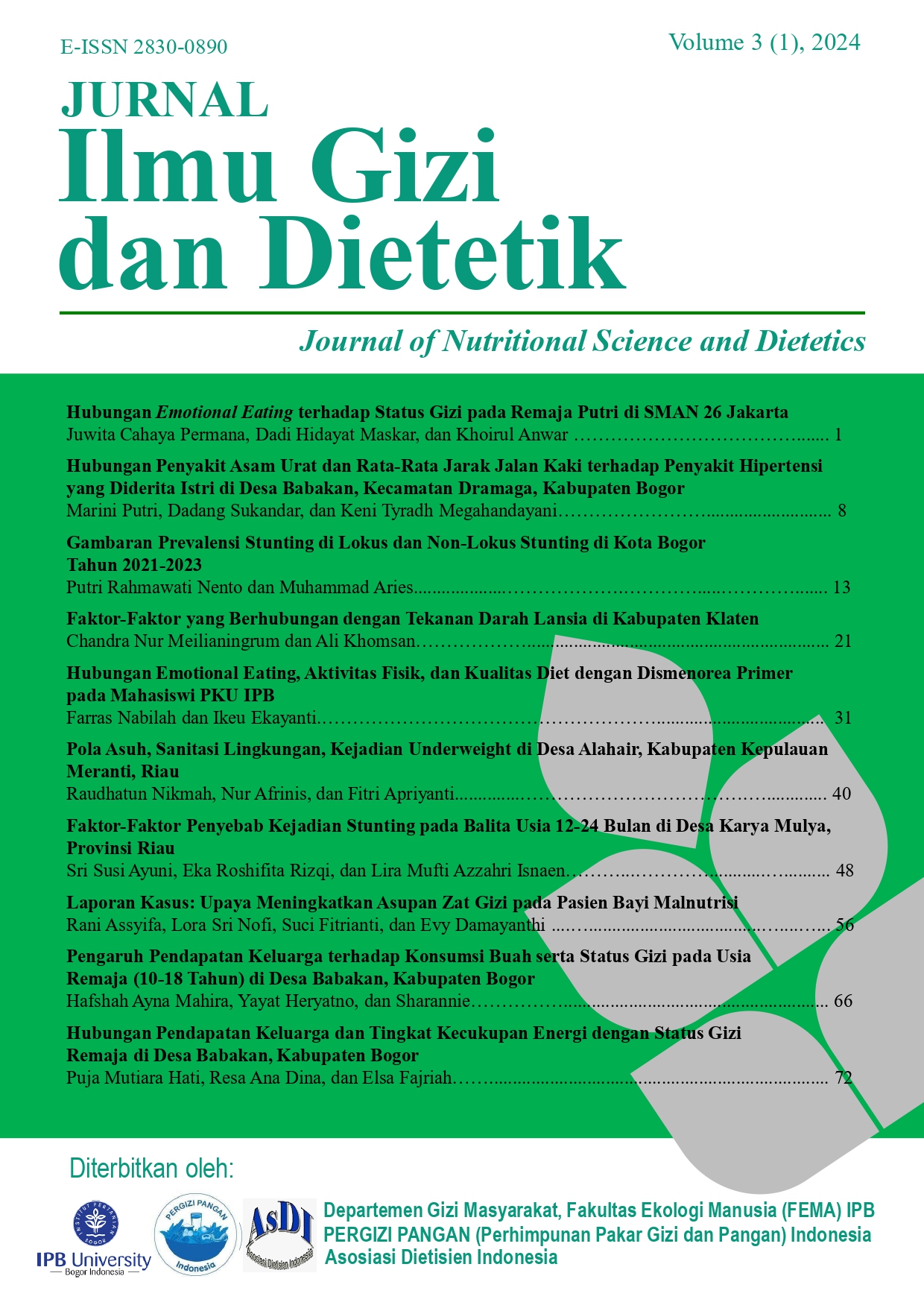Publication Ethics Statement
Jurnal Ilmu Gizi dan Dietetik is a double-blind peer-reviewed electronic journal, meaning both the reviewers and authors are anonymous to each other throughout the review process. This letter outlines the ethical guidelines for all parties involved in the publication process, including authors, the Editor-in-Chief, the editorial board, peer reviewers, and the publisher, IPB University. This publication ethics is based on COPE’s Core Practices and Elsevier Publishing Ethics.
ETHICAL GUIDELINE FOR JOURNAL PUBLICATION
Publishing articles in Jurnal Ilmu Gizi dan Dietetik through a peer-reviewed process is crucial for advancing nutritional science. It reflects the work of the authors and their institutions. Peer-reviewed articles ensure the correct scientific methods are followed and maintain the journal's quality standards. It is essential for all parties involved in the publication process to uphold ethical standards, including authors, editors, peer reviewers, publishers, and the general public.
IPB University, the publisher of the Jurnal Ilmu Gizi dan Dietetik, takes its duty to uphold high-quality publishing standards at every stage very seriously. We recognize the importance of maintaining ethical responsibilities. Our commitment ensures that sponsorship, distribution, and commercialization of the Jurnal Ilmu Gizi dan Dietetik do not influence editorial decisions on any article.
Authors
Reporting Standards: Authors must present an accurate account of their research and its significance. The data should be represented accurately, with sufficient detail and references to allow replication. Fraudulent or knowingly inaccurate statements are unethical and unacceptable.
Originality and Plagiarism: Authors should ensure their work is original and appropriately cite or quote any used work or words of others.
Multiple, Redundant, or Concurrent Publication: Authors should not publish the same research in more than one journal or primary publication. Submitting the same manuscript to multiple journals is unethical.
Acknowledgment of Sources. Authors must always properly acknowledge the contributions of others. They should cite publications that have significantly influenced the nature of their reported work.
Authorship of the Paper. Authorship should be restricted to individuals who have made substantial contributions to the conception, design, execution, or interpretation of the study. Anyone who has made significant contributions should be included as a co-author. Those who have participated in specific substantial aspects of the research should be acknowledged or listed as contributors. The corresponding author must ensure that all suitable co-authors are included, no unsuitable co-authors are listed, and that all co-authors have reviewed and approved the final version of the paper and agreed to its submission for publication.
Disclosure and Conflicts of Interest. Authors should disclose any financial or other conflicts of interest that could influence their manuscript's results or interpretation. All financial support sources should be disclosed.
Fundamental Errors in Published Works. Authors must promptly notify the journal editor or publisher if they discover significant errors in their published work and cooperate to retract or correct the paper.
Editors
- Editors are responsible for every article published in the journal.
- Editors should assist authors in following the author guidelines.
- Editors may consult with other editors or reviewers when making a final decision.
- Editors must evaluate manuscripts objectively, without considering the authors' nationality, ethnicity, political beliefs, race, religion, gender, seniority, or institutional affiliation. Editors should decline assignments with potential conflicts of interest.
- Editors must ensure that reviewers do not know the authors' identities, and vice versa.
- Editors should inform authors of their decisions, providing reviewers' comments unless they contain offensive or libelous remarks.
- Editors should respect reasonable requests from authors to exclude certain individuals from reviewing their submissions.
- Editors and all staff must keep submitted manuscripts confidential.
- Editors will follow COPE flowcharts in cases of suspected misconduct or disputed authorship.
Reviewers
Contribution to Editorial Decisions. Peer review helps editors make decisions and assists authors in improving their papers.
Promptness. Reviewers who feel unqualified or unable to review promptly should notify the editor and excuse themselves.
Confidentiality. Any manuscripts received for review must be treated as confidential documents. They must not be shown to or discussed with others except as authorized by the editor.
Standards of Objectivity. Reviews should be objective and devoid of personal criticism. Referees should express their views with supporting arguments.
Acknowledgment of Sources. Reviewers should point out relevant published works that the authors have not cited. Any claim that an observation, derivation, or argument was previously reported should be supported by the appropriate citation. Additionally, reviewers should alert the editor to any significant similarity or overlap between the manuscript under review and any other published paper they are aware of.
Disclosure and Conflict of Interest. Reviewers must maintain the confidentiality of privileged information or ideas acquired during the peer review process and refrain from exploiting them for personal gain. They should avoid assessing manuscripts where conflicts of interest arise due to competitive, collaborative, or other associations with any of the authors, companies, or institutions involved in the papers.












2.png)

